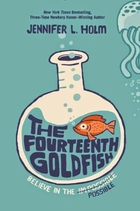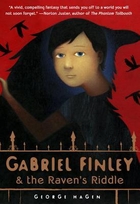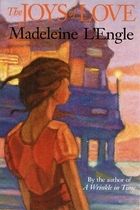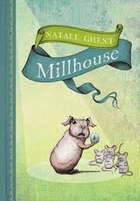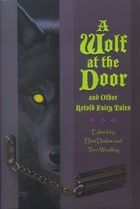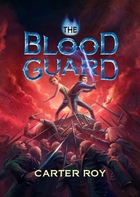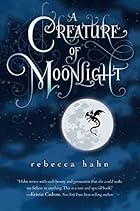The Fourteenth Goldfish by Jennifer L. Holm is a delightful sci-fi story for middle grade readers.
Ellie's
grandfather is a scientist. He's cranky, particular, and hoards packets
of soy sauce when they visit the Chinese restaurant. What Ellie does
not expect is that one day he will turn up at her house as a teenage
boy, having discovered a cure for aging using cells from a rare
jellyfish. Grandpa Melvin, now looking like an oddly-dressed
thirteen-year-old, is discovering that being a teenager again has its
drawbacks -- most notably, he can't get into his lab any more to
continue working on his experiments. Ellie, on the other hand, is
discovering the drawbacks of adolescence for the first time, as her best
friend discovers new interests that don't include Ellie. Then again,
Ellie is discovering new interests of her own: when Grandpa Melvin talks
about science, it's a lot more interesting than she ever realized
before. With the help of a new friend from school, Ellie and Grandpa
Melvin hatch a plan to rescue Grandpa Melvin's experiments from his lab
so he can continue his work. But Ellie is starting to wonder if there
might be serious consequences to Grandpa Melvin's discovery. Is helping
him continue to experiment really the best thing to do?
This
story has a lot of good things going for it: it's a fast, funny read
that incorporates a lot of science without becoming didactic. I thought
it had just a couple of weaknesses, all related to the ending, which I
don't want to give away here. So, if you find the summary intriguing,
you will just have to read it and tell me whether you buy what happens
at the end of the book, or if you (like me) were expecting a different
outcome based on certain clues in the text. But even though I'm not a hundred percent sold on the ending, I thought this was an excellent book, and I'll be recommending it to kids at my library.
(Reviewed from a copy borrowed through my library system.)
Sunday, September 28, 2014
Thursday, September 25, 2014
Gabriel Finley and the Raven's Riddle by George Hagen
Gabriel Finley and the Raven's Riddle by George Hagen is the first book in a new juvenile fantasy series.
Gabriel's mother disappeared when he was very young, and his father disappeared three years ago. And then there's his uncle Corax, who disappeared years before Gabriel was even born. That's a lot of disappearances for one family! But despite all of those mysterious disappearances, Gabriel lives a pretty normal life in his Aunt Jasmine's brownstone in Brooklyn. One day Gabriel asks his Aunt Jaz to tell him more about his father's disappearance -- a request he's made many times before -- and this time, she complies by giving him a small book. It is, in fact, his father's diary, and through it Gabriel learns many fantastical facts about his family, riddles, ravens, a valuable object, and a dangerous enemy. Gabriel is about to embark on the greatest adventure of his life . . . and it all starts when he rescues an orphaned baby raven named Paladin.
I've seen this book pitched as the next Harry Potter. Well, it's not that, but it is an enjoyable read that will appeal to the same fan base. If anything, I'd say it's the next Gregor the Overlander. I'll probably continue reading the series, and I'll certainly recommend it to fans of juvenile fantasy.
(Reviewed from a copy borrowed through my library system.)
Gabriel's mother disappeared when he was very young, and his father disappeared three years ago. And then there's his uncle Corax, who disappeared years before Gabriel was even born. That's a lot of disappearances for one family! But despite all of those mysterious disappearances, Gabriel lives a pretty normal life in his Aunt Jasmine's brownstone in Brooklyn. One day Gabriel asks his Aunt Jaz to tell him more about his father's disappearance -- a request he's made many times before -- and this time, she complies by giving him a small book. It is, in fact, his father's diary, and through it Gabriel learns many fantastical facts about his family, riddles, ravens, a valuable object, and a dangerous enemy. Gabriel is about to embark on the greatest adventure of his life . . . and it all starts when he rescues an orphaned baby raven named Paladin.
I've seen this book pitched as the next Harry Potter. Well, it's not that, but it is an enjoyable read that will appeal to the same fan base. If anything, I'd say it's the next Gregor the Overlander. I'll probably continue reading the series, and I'll certainly recommend it to fans of juvenile fantasy.
(Reviewed from a copy borrowed through my library system.)
Sunday, September 7, 2014
Isla and the Happily Ever After by Stephanie Perkins
Isla and the Happily Ever After by Stephanie Perkins is another sweet love story from the author of Anna and the French Kiss.
Isla has had a crush on Josh ever since she was a freshman at the School of America in Paris. When she has a chance encounter with him in a Manhattan cafe just before their senior year, she dares to dream that a relationship might be in the cards for the two of them. Sure enough, they go from swapping smitten stares across classrooms, to hanging out together at the comic shop, to making out in school broom closets and anywhere else that provides a modicum of privacy. Theirs is an unexpected pairing: Josh has carefully cultivated a bad-boy image, while Isla is the responsible, studious one who is likely to be valedictorian. In a classic case of opposites attracting, they are both head over heels with each other. But when a disastrous choice puts an ocean between them, Isla's doubts begin to surface: does Josh really love her, or was he just going out with her because she was there?
As with Perkins' other books, there's a lot to like here. Isla is sweet and funny, and her insecurities and concerns about her future make for a convincing teenage character (it's okay not to know what you want to do with your life at age 17). Isla and Josh's relationship is a lot more steamy and physical than Anna and St. Clair's or Lola and Cricket's, but it's described in that same delightful way that will have readers swooning. Also, I would really like to read Josh's graphic novel memoir now! There are cameos by Anna and St. Clair and Lola and Cricket, too, which are lovely but brief. All in all, I found this a satisfying romance, and it made me want to go back and reread the other two to see all the ways the three books fit together -- though I think that readers new to Perkins can start with any of the three books without missing too much.
(Reviewed from a copy borrowed through my library system.)
Isla has had a crush on Josh ever since she was a freshman at the School of America in Paris. When she has a chance encounter with him in a Manhattan cafe just before their senior year, she dares to dream that a relationship might be in the cards for the two of them. Sure enough, they go from swapping smitten stares across classrooms, to hanging out together at the comic shop, to making out in school broom closets and anywhere else that provides a modicum of privacy. Theirs is an unexpected pairing: Josh has carefully cultivated a bad-boy image, while Isla is the responsible, studious one who is likely to be valedictorian. In a classic case of opposites attracting, they are both head over heels with each other. But when a disastrous choice puts an ocean between them, Isla's doubts begin to surface: does Josh really love her, or was he just going out with her because she was there?
As with Perkins' other books, there's a lot to like here. Isla is sweet and funny, and her insecurities and concerns about her future make for a convincing teenage character (it's okay not to know what you want to do with your life at age 17). Isla and Josh's relationship is a lot more steamy and physical than Anna and St. Clair's or Lola and Cricket's, but it's described in that same delightful way that will have readers swooning. Also, I would really like to read Josh's graphic novel memoir now! There are cameos by Anna and St. Clair and Lola and Cricket, too, which are lovely but brief. All in all, I found this a satisfying romance, and it made me want to go back and reread the other two to see all the ways the three books fit together -- though I think that readers new to Perkins can start with any of the three books without missing too much.
(Reviewed from a copy borrowed through my library system.)
Saturday, September 6, 2014
Unthinkable by Nancy Werlin
Unthinkable by Nancy Werlin is the sequel to Impossible.
Lucy broke the curse on the Scarborough women, but Fenella, the curse's original victim, still isn't free. She's been a captive in Faerie all this time, cursed with unnaturally long life, forced to see Padraig's twisted desires fulfilled with each of her descendants. Now Padraig's power is broken, and Fenella just wants to die peacefully -- but she can't. She petitions the Queen of Faerie, and learns that the only way she can gain death is by completing three tasks, just as Lucy did. There's a twist, though: Fenella's tasks are all acts of destruction -- and they must be carried out against Fenella's family: Lucy, Zach, and baby Dawn, Lucy's adoptive parents Leo and Soledad, and poor Miranda, the last Scarborough to suffer the full effects of the curse. Fenella is determined to complete the tasks and earn her death, and to cause as little damage as possible in the process. But there are a few things she doesn't foresee...
I enjoyed this almost as much as Impossible, and more than Extraordinary, which is a companion to these two books. Fenella's desperation and determination at the beginning of the novel are tempered by her curiosity about 21st century life when she arrives at Lucy and Zach's house. I also really liked the way Fenella's back-story, the beginning of the Scarborough curse, is woven into the narrative. I recommend this book, but it's imperative to read Impossible first.
(Reviewed from a copy borrowed through my library system.)
Lucy broke the curse on the Scarborough women, but Fenella, the curse's original victim, still isn't free. She's been a captive in Faerie all this time, cursed with unnaturally long life, forced to see Padraig's twisted desires fulfilled with each of her descendants. Now Padraig's power is broken, and Fenella just wants to die peacefully -- but she can't. She petitions the Queen of Faerie, and learns that the only way she can gain death is by completing three tasks, just as Lucy did. There's a twist, though: Fenella's tasks are all acts of destruction -- and they must be carried out against Fenella's family: Lucy, Zach, and baby Dawn, Lucy's adoptive parents Leo and Soledad, and poor Miranda, the last Scarborough to suffer the full effects of the curse. Fenella is determined to complete the tasks and earn her death, and to cause as little damage as possible in the process. But there are a few things she doesn't foresee...
I enjoyed this almost as much as Impossible, and more than Extraordinary, which is a companion to these two books. Fenella's desperation and determination at the beginning of the novel are tempered by her curiosity about 21st century life when she arrives at Lucy and Zach's house. I also really liked the way Fenella's back-story, the beginning of the Scarborough curse, is woven into the narrative. I recommend this book, but it's imperative to read Impossible first.
(Reviewed from a copy borrowed through my library system.)
Friday, September 5, 2014
The Joys of Love by Madeleine L'Engle
The Joys of Love by Madeleine L'Engle is a coming-of-age story set in the world of summer stock theatre just after the second World War.
Elizabeth's Aunt Harriet does not approve of the theatre, but it's been Elizabeth's dream ever since she can remember. Elizabeth's parents are dead, and her strict aunt has seen to her upbringing, but Elizabeth made a deal with Aunt Harriet before going to college: if Elizabeth studied chemistry and graduated with honors, she would be allowed a summer working in the theatre. And, finally, that summer has arrived. Elizabeth managed to secure an unpaid apprenticeship, and Aunt Harriet begrudgingly sends a weekly check for room and board. Elizabeth is having the time of her life with her new friends... and Kurt. Kurt Canitz is the charismatic young director, and he finds Elizabeth's naivete refreshing. Elizabeth is a bit starstruck and madly in love. She knows he doesn't exactly love her, not the way that she loves him, but she turns a deaf ear to her friends' warnings about the danger Kurt poses to her heart. And of course there's plenty of other backstage drama as well. Just when it looks like both love and theatrical success are within Elizabeth's grasp, things fall apart. Will Elizabeth have to give up on her dreams?
Published after L'Engle's death, this early novel of hers is a sweet and simple story drawing on her own experiences as a young woman in the theatrical world. The book's title is a reference to the song "Plaisir D'Amour" -- "The pleasure of love lasts only a moment / The grief of love lasts a lifetime." Elizabeth is full of love for both Kurt and the world of the theatre, but when Kurt disappoints her (as it's obvious he's going to do; that's hardly a spoiler, right?), she has to grow up a bit and take a look at the theatrical world that she's idealized, and decide whether it's still what she wants to do if it's not as gleaming and perfect as it seemed from Aunt Harriet's spare bedroom. I really enjoyed this book, though it's perhaps not as deep and complex as some of L'Engle's better-known books.
(Reviewed from an advance copy, courtesy of the publisher . . . er, some time ago.)
Elizabeth's Aunt Harriet does not approve of the theatre, but it's been Elizabeth's dream ever since she can remember. Elizabeth's parents are dead, and her strict aunt has seen to her upbringing, but Elizabeth made a deal with Aunt Harriet before going to college: if Elizabeth studied chemistry and graduated with honors, she would be allowed a summer working in the theatre. And, finally, that summer has arrived. Elizabeth managed to secure an unpaid apprenticeship, and Aunt Harriet begrudgingly sends a weekly check for room and board. Elizabeth is having the time of her life with her new friends... and Kurt. Kurt Canitz is the charismatic young director, and he finds Elizabeth's naivete refreshing. Elizabeth is a bit starstruck and madly in love. She knows he doesn't exactly love her, not the way that she loves him, but she turns a deaf ear to her friends' warnings about the danger Kurt poses to her heart. And of course there's plenty of other backstage drama as well. Just when it looks like both love and theatrical success are within Elizabeth's grasp, things fall apart. Will Elizabeth have to give up on her dreams?
Published after L'Engle's death, this early novel of hers is a sweet and simple story drawing on her own experiences as a young woman in the theatrical world. The book's title is a reference to the song "Plaisir D'Amour" -- "The pleasure of love lasts only a moment / The grief of love lasts a lifetime." Elizabeth is full of love for both Kurt and the world of the theatre, but when Kurt disappoints her (as it's obvious he's going to do; that's hardly a spoiler, right?), she has to grow up a bit and take a look at the theatrical world that she's idealized, and decide whether it's still what she wants to do if it's not as gleaming and perfect as it seemed from Aunt Harriet's spare bedroom. I really enjoyed this book, though it's perhaps not as deep and complex as some of L'Engle's better-known books.
(Reviewed from an advance copy, courtesy of the publisher . . . er, some time ago.)
Thursday, September 4, 2014
Millhouse by Natale Ghent
Millhouse by Natale Ghent is the story of a theatrical guinea pig languishing in a pet shop.
Ever since his former owner died, Millhouse (or Milly, as he prefers to be called) has lived at a rather unsuccessful pet shop. The other small animals at the shop make fun of him for his theatrical ambitions, and because he is a hairless guinea pig. Indeed, his appearance has proved off-putting to more than one potential buyer, and Milly wonders if he will spend his entire friendless life in a cage at the shop. Fortunately for Milly, friendship awaits in unexpected places, and there may yet be the perfect home out there just for him.
This book wanted to be one of those sweet and charming animal stories, but I found it only moderately successful. Milly's foibles didn't make me like him better, and although I did thoroughly dislike the other guinea pigs at the pet shop, I didn't think they were particularly distinct or at all well-developed characters. Perhaps young readers who really love stories of animals (and guinea pigs in particular) will embrace this book more than I did, but I'm just not feeling it.
(Reviewed from a finished copy, courtesy of the publisher, obtained through the LibraryThing Early Reviewers program.)
Ever since his former owner died, Millhouse (or Milly, as he prefers to be called) has lived at a rather unsuccessful pet shop. The other small animals at the shop make fun of him for his theatrical ambitions, and because he is a hairless guinea pig. Indeed, his appearance has proved off-putting to more than one potential buyer, and Milly wonders if he will spend his entire friendless life in a cage at the shop. Fortunately for Milly, friendship awaits in unexpected places, and there may yet be the perfect home out there just for him.
This book wanted to be one of those sweet and charming animal stories, but I found it only moderately successful. Milly's foibles didn't make me like him better, and although I did thoroughly dislike the other guinea pigs at the pet shop, I didn't think they were particularly distinct or at all well-developed characters. Perhaps young readers who really love stories of animals (and guinea pigs in particular) will embrace this book more than I did, but I'm just not feeling it.
(Reviewed from a finished copy, courtesy of the publisher, obtained through the LibraryThing Early Reviewers program.)
Wednesday, September 3, 2014
A Wolf at the Door, edited by Ellen Datlow and Terri Winding
A Wolf at the Door and Other Retold Fairy Tales,
edited by Ellen Datlow and Terri Windling, is a short story collection
that I've had on my shelf for a while now, and I finally got around to
reading it. It's much what I would expect from a Datlow/Windling
compilation -- stories ranging from moderately good to very good, from
familiar writers as well as lesser-known ones. The real gem of this
collection is Neil Gaiman's poem, "Instructions,"
which was later published as a picture book. I enjoyed all of the other
stories, but none of them stuck with me in the same way. This is a
solid collection, recommended for those who love fairy tales.
(Reviewed from my personally purchased copy.)
(Reviewed from my personally purchased copy.)
Tuesday, September 2, 2014
The Blood Guard by Carter Roy
The Blood Guard by Carter Roy is the first book in an action-packed middle-grade series.
Ronan Truelove thought he had a pretty normal life. Sure, his mom kept his schedule packed with extracurriculars like fencing and taekwondo, but he figures she just wants him to be well-rounded so he can get into a good college. And yeah, there was that weird fire at his house a year or so ago, the one the authorities ended up calling a freak accident, but that sort of thing could have happened to anyone. But on the day his mom pulls him out of school and drives off, tailed by a couple of aggressive SUVs, everything Ronan thinks he knows about his life starts to change. In the course of that high-speed car chase, Ronan finds out that his mother is a member of an ancient fighting force known as the Blood Guard, who exist to protect 36 pure souls whose existence balances the levels of good and evil in the universe. And Ronan is being trained to follow in her footsteps. As the two evade the mysterious bad guys who are chasing them, Ronan's mom tells him that his father has disappeared, their house is no longer safe, and he must get on a train bound for Washington D.C., where another member of the Blood Guard would meet up with him and keep him safe. Unfortunately, things don't go exactly as planned. Ronan will soon be on the adventure of his life, accompanied by a cheeky teenage pickpocket named Jack, and Greta, a scrappy acquaintance from a previous school. Pursued by strangers who mean them harm, can they get to safety? Is safety even an option for Ronan any more, now that he knows about the Blood Guard?
I found this a great, fast-paced read. In tone, it's very similar to the Percy Jackson series -- the same wry humor in the face of fantastical danger. There were a couple of places where the writing faltered (I had a hard time keeping track of where characters were in the big running-and-fighting scene near the end of the book), but all in all, this was a satisfying, exciting read, and I'll probably read more books in the series when they are available. I'll definitely be recommending this to Percy Jackson fans looking for read-alikes.
(Reviewed from a copy borrowed through my library system.)
Ronan Truelove thought he had a pretty normal life. Sure, his mom kept his schedule packed with extracurriculars like fencing and taekwondo, but he figures she just wants him to be well-rounded so he can get into a good college. And yeah, there was that weird fire at his house a year or so ago, the one the authorities ended up calling a freak accident, but that sort of thing could have happened to anyone. But on the day his mom pulls him out of school and drives off, tailed by a couple of aggressive SUVs, everything Ronan thinks he knows about his life starts to change. In the course of that high-speed car chase, Ronan finds out that his mother is a member of an ancient fighting force known as the Blood Guard, who exist to protect 36 pure souls whose existence balances the levels of good and evil in the universe. And Ronan is being trained to follow in her footsteps. As the two evade the mysterious bad guys who are chasing them, Ronan's mom tells him that his father has disappeared, their house is no longer safe, and he must get on a train bound for Washington D.C., where another member of the Blood Guard would meet up with him and keep him safe. Unfortunately, things don't go exactly as planned. Ronan will soon be on the adventure of his life, accompanied by a cheeky teenage pickpocket named Jack, and Greta, a scrappy acquaintance from a previous school. Pursued by strangers who mean them harm, can they get to safety? Is safety even an option for Ronan any more, now that he knows about the Blood Guard?
I found this a great, fast-paced read. In tone, it's very similar to the Percy Jackson series -- the same wry humor in the face of fantastical danger. There were a couple of places where the writing faltered (I had a hard time keeping track of where characters were in the big running-and-fighting scene near the end of the book), but all in all, this was a satisfying, exciting read, and I'll probably read more books in the series when they are available. I'll definitely be recommending this to Percy Jackson fans looking for read-alikes.
(Reviewed from a copy borrowed through my library system.)
Monday, September 1, 2014
A Creature of Moonlight by Rebecca Hahn
A Creature of Moonlight by Rebecca Hahn is a fairytale-like story of finding your place in the world.
For as long as she can remember, Marni has lived with her Gramps in a little cottage at the edge of the forest, selling flowers to the villagers and the courtiers alike. The forest is a place of powerful magic, filled with mysterious creatures. Sometimes, young women run away into the forest and are never heard from again. The forest can even encroach on farmland overnight, and it seems to be advancing across the kingdom. Marni doesn't fear the forest, though, and it never creeps any closer to the cottage where she lives. Perhaps that is because Marni's mother was the only runaway girl who ever returned from the forest -- though she paid a horrible price for doing so. Marni's mother was a princess, and she returned from the forest bearing an illegitimate child, what was called, in that country, a "dragon's child." And for that, her own brother killed her. He would have killed Marni, too, but his father stood in the way of the sword, and promised to abdicate the throne if he would spare the child. Now, Marni and her Gramps sell flowers, and her uncle is the king. Marni is content to let things go on the way they always have, but she is changing, drawing the attention of both lords and village boys . . . and her Gramps is getting older. Marni is not exactly a princess, but she's not exactly a villager, either -- and, though the forest calls to her, she can't quite embrace the fate of those heedless runaway girls. Where does Marni belong?
This is a lovely, engaging, and well-written story. My only real problem with it was that I had a hard time accepting the setup described above, with the ex-king and the ex(?)-princess living in a cottage within walking distance, apparently, of the castle. Perhaps it was the way it was presented; by the end of the story I had fewer issues, but at the beginning I found it rather hard to swallow. Still, I got past it and very much enjoyed the story as presented. I'll look forward to seeing more from this author, and would recommend this book to readers who like stories with a distinctive fairytale feel and beautiful prose.
(Reviewed from an advance copy, courtesy of the publisher.)
For as long as she can remember, Marni has lived with her Gramps in a little cottage at the edge of the forest, selling flowers to the villagers and the courtiers alike. The forest is a place of powerful magic, filled with mysterious creatures. Sometimes, young women run away into the forest and are never heard from again. The forest can even encroach on farmland overnight, and it seems to be advancing across the kingdom. Marni doesn't fear the forest, though, and it never creeps any closer to the cottage where she lives. Perhaps that is because Marni's mother was the only runaway girl who ever returned from the forest -- though she paid a horrible price for doing so. Marni's mother was a princess, and she returned from the forest bearing an illegitimate child, what was called, in that country, a "dragon's child." And for that, her own brother killed her. He would have killed Marni, too, but his father stood in the way of the sword, and promised to abdicate the throne if he would spare the child. Now, Marni and her Gramps sell flowers, and her uncle is the king. Marni is content to let things go on the way they always have, but she is changing, drawing the attention of both lords and village boys . . . and her Gramps is getting older. Marni is not exactly a princess, but she's not exactly a villager, either -- and, though the forest calls to her, she can't quite embrace the fate of those heedless runaway girls. Where does Marni belong?
This is a lovely, engaging, and well-written story. My only real problem with it was that I had a hard time accepting the setup described above, with the ex-king and the ex(?)-princess living in a cottage within walking distance, apparently, of the castle. Perhaps it was the way it was presented; by the end of the story I had fewer issues, but at the beginning I found it rather hard to swallow. Still, I got past it and very much enjoyed the story as presented. I'll look forward to seeing more from this author, and would recommend this book to readers who like stories with a distinctive fairytale feel and beautiful prose.
(Reviewed from an advance copy, courtesy of the publisher.)
Subscribe to:
Comments (Atom)
